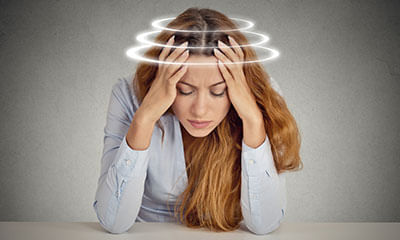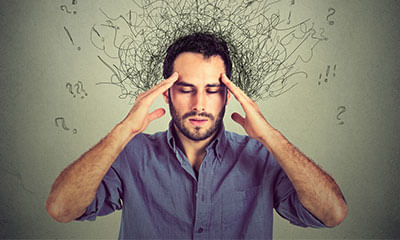Clonazepam For Anxiety
Namaste sir/madam. I have been on betahistine 8 mg twice a day for bppv vertigo since 4 months and escitalopram plus clo ...
Ask Free Question
MRI is the best investigation in your case. Show the result to your family physician who will advise you who to consult, neurologist, orthopedician or ENT surgeon.
Doc has prescribed bupron xl 150 after breakfast. After that am suffering from sleeplessness. I am also taking melatonin ...
Ask Free Question
Melatonin helps in sleep initiation and clonazepam helps in all phases of sleep (initiation, maintenance and duration of sleep). Hence, if required then you can take both. However, you can consider of improving your sleep hygiene, if it is deranged.
I have anxiety and sleep disorder. Doctor prescribed nexito plus tablet. For first 10-15 days I overslept (10 hrs a day) ...
Ask Free Question
You don't go in medication you need psychological counseling and psychological autosuggestion therapy through the online process for three weeks without any medication for the removal of your psychological problems of anxiety and sleep disorder. You can contact me for this on Lybrate website or direct contact me for this on mobile. Thank you.
Hi one of my female friend age 29 weight 35 kg reduced 10 kg in two year suffering from anxiety, depression problem we h ...
Ask Free Question
You should take an opinion of gastroenterologist as losing 10 kg in 2 years when the weight is just 35 kg is very unusual. Simultaneously, in her case a short admission can be considered for detailed evaluation and to see what medication suits her well as she is having very low weight and suicidal thoughts. She needs a multidisciplinary treatment.
I am advised to take fluanxol 0.5 mg / spenzo 0.5 mg 1-0-1, along with qutipin 100 mg 1-0-1. I am also on venlor xr 75 m ...
Ask Free Question
I understand your concerns about medication safety, especially when taking multiple medications. Here's some general information about the medications you mentioned: Fluanxol (Flupentixol): This is an antipsychotic medication often used for schizophrenia or other similar conditions. It can also be used in lower doses for depression. Spenzo (Etizolam): This is a medication that is used for anxiety. It belongs to a class of drugs similar to benzodiazepines and has sedative and muscle-relaxant effects. Qutipin (Quetiapine): This is an antipsychotic medication often used to treat bipolar disorder, schizophrenia, and as an add-on treatment for depression. Venlor XR (Venlafaxine): This is an antidepressant that belongs to the class of serotonin-norepinephrine reuptake inhibitors (SNRIs). Clonotril (Clonazepam): This is a benzodiazepine used for anxiety and seizure disorders. Regarding your specific questions: a) Banned Status: The status of medications can vary by country and region. Fluanxol and Spenzo are not universally banned but may have restrictions in certain regions. It's important to check the regulations and guidelines in your specific location. b) Combining Medications: Taking multiple medications can increase the risk of side effects and drug interactions. It is essential to follow the advice of a healthcare professional who is familiar with your medical history and the specific medications you are taking. They can provide guidance on whether these medications can be taken together, appropriate dosages, and monitoring for side effects or interactions. Remember, it's crucial to consult with your healthcare provider before starting, stopping, or changing any medication regimen, especially when dealing with complex treatments involving multiple drugs. They can give you the most accurate and personalized advice based on your health needs and current medical condition.
Sir/ madam I am sekhar my age is 42 jam suffering from chronic dysthymia, chronic anxiety tension, chronic insomnia, chr ...
Ask Free Question
I'm sorry to hear about the difficulties you're facing with your health. Managing multiple chronic conditions like dysthymia, anxiety, insomnia, chronic fatigue syndrome, and overactive bladder, along with the side effects of various medications, can be extremely challenging. Here are some points to consider based on the information you've shared: medication side effects and interactions: it's clear that you've experienced a range of side effects from different medications. This is not uncommon, especially when dealing with multiple medications for complex conditions. Each person's response to medication can vary greatly. Impact on health conditions: certain medications, especially psychiatric drugs like antipsychotics, mood stabilizers, and some antidepressants, can contribute to metabolic changes. These changes can potentially lead to conditions like prediabetes and fatty liver. It's important to monitor your physical health regularly while on these medications. Consulting healthcare professionals: given the complexity of your situation and the range of medications you've tried, continued consultation with healthcare professionals is crucial. If access to a psychiatrist is limited in your area, consider telemedicine options, which can connect you with specialists remotely. Medication choices: duloxetine: often used for depression, anxiety, and certain types of pain. It can have side effects like nausea, drowsiness, and sexual dysfunction. Bupropion (bupran): an antidepressant that's sometimes preferred for its lower risk of sexual side effects and sleepiness. However, it needs to be used cautiously in individuals with a history of seizures or heavy alcohol use. Zolpidem (zolfresh): a sedative used for short-term management of insomnia. It can be effective for sleep, but it's not typically recommended for long-term use. Melatonin: a supplement used for sleep problems. Headaches can be a side effect for some people. Lifestyle modifications: in addition to medication, lifestyle changes can play a significant role in managing these conditions. Regular exercise, a healthy diet, good sleep hygiene, stress reduction techniques, and avoiding alcohol can all contribute positively to your health. Therapy and support: psychological therapies, such as cognitive-behavioral therapy (cbt), can be very effective for mood and anxiety disorders, and even for insomnia (cbt-i for insomnia). These therapies can be accessed in person or via online platforms. Regular monitoring and follow-up: regular follow-up with your healthcare provider is important, especially if you're considering changes to your medication regimen. This will help manage your conditions safely and monitor for any side effects or complications. Remember, it's crucial to work closely with healthcare professionals who can provide personalized advice and treatment based on your specific health needs. Don't hesitate to reach out for support or a second opinion if you feel your current treatment plan isn't working well for you.
I was on nexito plus for 6 months (march to september). Later, on doctor's advice I tapered it to 1/2 the pill. For quit ...
Ask Free Question
It's good that you're thinking carefully about how to manage your medication, particularly when it comes to tapering off drugs like nexito plus (which usually contains escitalopram, an antidepressant, and clonazepam, a benzodiazepine). Here are some general principles for safely discontinuing medications like these: gradual reduction: tapering off medication, particularly antidepressants and benzodiazepines, should generally be done gradually. This helps to minimize withdrawal symptoms. The specific rate of tapering can vary depending on factors like how long you've been taking the medication, the dosage, your individual response to medication reduction, and any withdrawal symptoms you might experience. Individualized plan: the tapering schedule should be individualized based on your unique situation. What's too rapid for one person might be okay for another. It's important that this plan is developed in collaboration with your healthcare provider. Monitoring symptoms: while tapering off medications, it's crucial to monitor for any withdrawal symptoms. These can include anxiety, mood swings, sleep disturbances, and physical symptoms. If severe withdrawal symptoms occur, it's often a sign that the tapering is happening too quickly. Consulting your doctor: given your concerns about the rapidity of the tapering schedule, it's important to discuss this with your doctor. They can adjust the tapering schedule based on your feedback and symptoms. It's not uncommon for tapering plans to be adjusted as you go along. Supportive therapies: in addition to medication, therapies such as counseling or cognitive-behavioral therapy can be beneficial, especially during the tapering process. They can provide additional support and help manage any underlying issues that the medication was treating. Lifestyle factors: engaging in healthy lifestyle practices such as regular exercise, good nutrition, adequate sleep, and stress management can also support the process of tapering off medication. Remember, the process of tapering off medication can vary greatly from person to person. It's important to do it under the guidance of your healthcare provider, who can offer the most appropriate advice for your specific circumstances. Don't hesitate to reach out to them with your concerns and questions.
Sir mujhe 1 year se problem hai mood change hota rahta hai agressive behaviour ho jata hai nind nhi aati har kisi pe gus ...
Ask Free Question
Hello lybrate-user, this is deepiksha (psychologist) I read your concern. Wht I will suggest you to take the psychotherapy because the behavioural changes you are facing is not normal. Aap medicines ke sath counselling k sessions lijiye jiske andr therapies hoti hai taaki apke jo bhi triggers hai and issues h wo phle address ho unka cause pta chale ki ye anger and sleep problems q aari h unko apn counselling se kaise sahi kar skte h uske baad apko fark dikhega. Please take professional counselling. Take care dear.
I am 20 years female having panic attacks since 3 years which is sever in type lasting more than half an hr 3 to 4 times ...
Ask Free Question
Etilaam pro contains etizolam and propranolol, which act on the symptoms of anxiety (mild) and do not modify the cause of panic attacks, which is serotnergic imbalance in the mind (brain). So ideal treatment based on the frequency of panic attacks would be a course of ssris if they are very frequent. If they occur once in 3-6 month or so, clonazepam is ideal choice. Good luck.
Suffering from anxiety on medication tab clonil 25hs, tab fluvoxamine 25 mg bd, tab clonazepam. 5 mg bd frm 02 yrs 02 da ...
Ask Free Question
Clonazepam 5 mg bd is a dangerously high dose. Please consult a psychiatrist asap to taper medication. Fatty liver is caused by diet and lifestyle causes and not by these medications.









